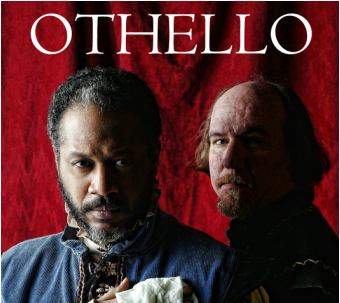West Philly’s Curio Theatre Company starts off 2015 with a production of Shakespeare’s OTHELLO. Presented on their intimate “Corner Stage” on the lower level of the Calvary Center, the production is directed by Dan Hodge and runs through March 14.
OTHELLO was written in approximately 1603; the story revolves around four central characters: Othello, a Moorish general in the Venetian army; his beloved wife, Desdemona; his loyal lieutenant, Cassio; and his trusted (but unfaithful) ensign, Iago. Dealing with such varied themes as jealousy, revenge, betrayal and repentance, it has remained very relevant from the 17th century through to the present. It’s exploration of racism gives OTHELLO a particular timeliness in light of recent US events. At the time Shakespeare wrote it, England was a white Anglo-Saxon nation; anyone of a darker skin or hair color was referred to as “black,” and viewed with some suspicion. Racism per se wasn’t a widespread system of oppression, but did exist as a shared set of pre-conceived notions regarding certain groups.
Othello is keenly aware of his position as an outsider, the “only ‘only’,” as a friend of mine used to put it. Steve Wright brings dignity and charm to the early scenes in the play, nicely conveying the poetry of Shakespeare’s language. He deftly shows us that Othello is an alpha male amongst his troops, but able to display true tenderness for Desdemona. The fact that some of that confidence is masking long-held feelings of inadequacy is what allows Iago to manipulate him into distrusting his wife. As Desdemona, Isa St. Clair is lovely as a young woman in the throes of a new love and marriage. She navigates the path of attempting to appease her father while being loyal to her lord perfectly. Hers is a truly innocent Desdemona—but not a silly or stupid one.
Rachel Gluck gives a strong performance as Iago’s wife, Emilia. She lets us see a woman worn down by a cruel and detached husband, one who knows that society will offer her no support. Othello’s lieutenant, Michael Cassio, is nicely handled by Eric Scottolati, in a well-defined and nuanced performance. Scottolati gives us a portrait of a young man trying to get ahead in the world who unknowingly gets sucked into the vortex of Iago’s schemes.
Although eponymously titled, the play really belongs to Iago—one of Shakespeare’s greatest villains. It is Iago who drives the story, manipulating all around him as he exacts revenge on Othello. He plays on others weaknesses like a master musician plays his instrument. Iago uses Othello’s “otherness” to influence those around him, and he takes advantage of Othello’s insecurities about his place in society to set the scheme in motion. I have to admit to being somewhat uninspired by Brian McCann’s portrayal. McCann is a gifted performer (I loved him in OEDIPUSSY and ROSENCRANTZ & GUILDENSTERN), but I personally felt there was some fire missing. He didn’t seem to be enjoying his machinations like one would expect Iago to. I’m not saying he’s wrong, but there was just something missing for me…
Rounding out the ensemble are Colleen Hughes as Bianca (a saucy performance, as well as some lovely singing); the always spot-on Paul Kuhn as Rodrigo, the buffoon who loves Desdemona (and whom Iago viciously murders to cover up his deeds), and Robert Weick and Steve Carpenter as assorted other members of the army. Both men do solid work, proving you do need strong actors in supporting roles of Shakespeare plays, as well as in the leads.
As always, Paul Kuhn has provided a terrific—albeit simple—playground for the cast to perform on. One gets a sense of Venice of old via the marbleized floor and pillars; and the multiple entrances allows the action to move swiftly from scene to scene. Tim Martin nicely lights the space, evoking varying times of day—and weather conditions—as well as guiding the audience’s attention to the main action. A wonderfully rich soundscape has been created by Dan Ison; it really sets the tone and perfectly assists the other design elements in putting us in the right mood. Finally, Aetna Gallagher’s lovely costumes give a true sense of timeframe, in addition to denoting the wearer’s station in life.
It is a good choice to present the piece in Curio’s intimate Corner Stage; it puts the audience “up close and personal” to the action. And the small ensemble allows director Dan Hodge to hone in on the key elements of the story and minimize the “spectacle.” Hodge has sort of become the “go-to” director for interpreting Shakespeare’s plays of late. His productions of both Hamlet and Macbeth at Hedgerow were riveting. But this OTHELLO did not have the same razor-sharp focus to me. In the interest of full disclosure, I saw a preview, so I’m sure things will grow as the run progresses.
OTHELLO is one of the few Shakespeare’s plays I had not seen onstage prior to attending Curio’s version. It is a very complex and layered story—like most of the Bard’s tragedies. Hodge and his cast clearly have a solid understanding of the language and convey the story to the audience well. I’ve no doubt the ensemble will continue to explore the characters throughout, finding new layers to play. Challenge yourself and shake off the winter doldrums by taking a seat in the Corner Stage to be pulled into a story of love, lust and revenge that has been a model for the genre since its inception.
OTHELLO
by William Shakespeare
Directed by Dan Hodge
February 12—March 14, 2015
Curio Theatre Company
Calvary Center for Culture & Community
4740 Baltimore Avenue
Philadelphia, PA 19143
215-525-1350
www.curiotheatre.org


